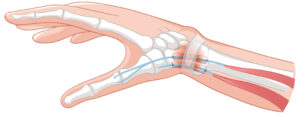Carpal tunnel syndrome is one of the most common workplace injuries, particularly for individuals in jobs requiring repetitive hand and wrist movements. Under workers’ compensation law, employees who develop carpal tunnel syndrome due to their job may be entitled to benefits. Understanding what qualifies as a carpal tunnel injury and how to navigate the workers’ compensation process can help you protect your rights as an employee.
Understanding Carpal Tunnel Syndrome
Carpal tunnel syndrome occurs when the median nerve, which runs through the wrist, becomes compressed. This compression can result in pain, numbness, tingling, and weakness in the hand and arm. Over time, repetitive hand motions such as typing, using machinery, or assembly line work can lead to this condition.
Symptoms of Carpal Tunnel Syndrome
- Pain or discomfort in the wrist, hand, or forearm
- Numbness or tingling, especially in the thumb, index, and middle fingers
- Weakness in the hand, making it difficult to grip objects
- Symptoms that worsen at night or after long periods of activity
If you experience any of these symptoms, it’s important to seek medical attention and report the issue to your employer as soon as possible.
How Carpal Tunnel Syndrome Qualifies Under Workers’ Compensation
To qualify for workers’ compensation benefits due to carpal tunnel syndrome, you must be able to prove that your condition is work-related. This means showing that your job duties directly contributed to the development of your injury.
Common Work-Related Causes of Carpal Tunnel Syndrome
Some examples of tasks that may lead to carpal tunnel syndrome include:
- Typing or using a computer mouse for extended periods
- Operating machinery that requires repetitive hand motions
- Using tools such as drills, hammers, or screwdrivers on a frequent basis
- Working on an assembly line where repetitive wrist movements are common
It’s crucial to establish a clear connection between your job duties and your diagnosis of carpal tunnel syndrome.
Filing a Workers’ Compensation Claim for Carpal Tunnel Syndrome
If you believe your carpal tunnel syndrome is work-related, filing a workers’ compensation claim can help cover medical expenses and lost wages. Here are the steps to follow:
Steps to Take
- Report the Injury: Inform your employer about your symptoms and how they relate to your job. Be sure to do this as soon as possible, as delays can complicate your claim.
- Seek Medical Attention: A doctor will evaluate your condition, determine the severity of your carpal tunnel syndrome, and provide necessary treatment. Make sure your doctor notes the connection between your injury and your job.
- File a Workers’ Compensation Claim: Work with your employer to file the claim. Be sure to include all relevant medical documentation and any information that supports your claim of a work-related injury.
Challenges in Proving Carpal Tunnel as a Work-Related Injury
Proving that carpal tunnel syndrome is work-related can be difficult in some cases. Since carpal tunnel syndrome can also result from non-work activities, such as hobbies or underlying health conditions, it may be challenging to demonstrate that your job duties were the primary cause.
Factors That May Complicate Your Claim
- Pre-existing conditions such as arthritis or diabetes
- Participation in activities outside of work that involve repetitive hand or wrist motions
- Delayed reporting of symptoms, which could lead to questions about the cause of your injury
Despite these challenges, it is possible to receive workers’ compensation benefits if you can show that your job duties were a significant contributing factor to your condition.
How PLBH Can Help
Navigating a workers’ compensation claim for carpal tunnel syndrome can be complex, especially when it comes to proving the cause of your injury. At PLBH, we understand the challenges employees face when filing claims for work-related injuries, and we’re here to help.
Our experienced legal team will work with you to gather the necessary evidence, including medical records and expert testimony, to strengthen your claim. If your workers’ compensation claim is denied, we will fight to ensure you get the benefits you deserve.
If you believe you have developed carpal tunnel syndrome due to your job, contact PLBH today at (800) 435-7542 for a consultation. Let us help you protect your rights and secure the compensation you’re entitled to under California law.

